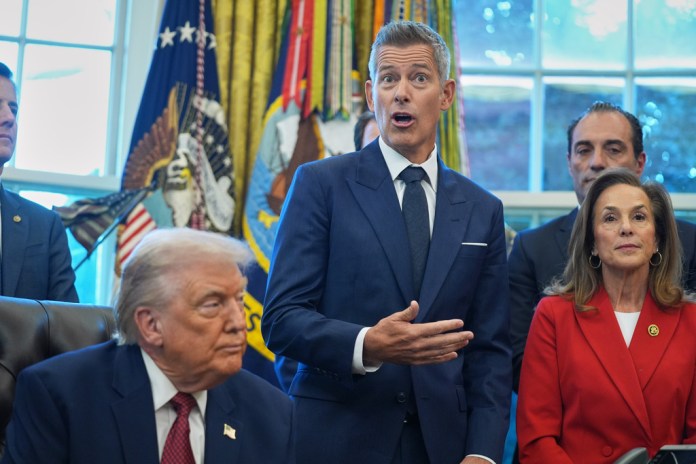Dems look to indigenous knowledge for fire help – Washington Examiner
Federal and state officials in California are increasingly incorporating “indigenous knowledge,” also referred to as “traditional ecological knowledge,” into their strategies for wildfire preparedness and management. This shift, motivated by the desire to mitigate wildfire risks and damages, follows recent devastating fires in Los Angeles County and includes significant funding from the California Department of Forestry and Fire Protection and the National Science Foundation (NSF), which has committed millions to these initiatives between 2023 and 2024.
In November 2022, the Biden administration issued directives for over two dozen federal agencies to integrate indigenous knowledge into their operations, defining it as a collection of insights and practices developed by Indigenous Peoples through their environmental interactions. This approach aims to create a more collaborative framework, allowing for the exchange of indigenous and Western scientific methodologies in wildfire management, with grants funding workshops to achieve this interconnection.
While some studies support the alignment between indigenous practices—such as controlled burns—and mainstream scientific techniques,criticism persists regarding the potential dangers of prioritizing indigenous knowledge over empirical scientific methods,with experts voicing concerns about the implications this could have on safe and effective wildfire management.
The broader agenda underlying this initiative suggests a shift in perspective that not only seeks to acknowledge the ecological wisdom inherent in indigenous practices but also aims to address historical marginalization of these systems within the scientific community. The efforts reflect a national trend to engage Indigenous communities in discussions concerning environmental conservation and climate change, with the potential to enrich scientific understanding through diverse knowledge systems.
Government officials turned to ‘indigenous knowledge’ to combat Californian wildfires
Federal and state officials turned toward “’indigenous knowledge,” also known as “traditional ecological knowledge,” to help California better prepare for wildfires prior to the recent blazes in Los Angeles County, spending millions of dollars in the process.
The California Department of Forestry and Fire Protection and the National Science Foundation have collectively spent millions on projects intended to extract ancient knowledge from Native Americans to then be applied to mitigate the risk and damages of wildfires. The grants, disbursed between 2023 and 2024, preceded the recent widespread fires in the Los Angeles area. As the fires continue to burn, officials serving California and Los Angeles have faced criticism online for allegedly prioritizing diversity initiatives and other left-of-center agenda items over competency.
In November 2022, the Biden administration directed over two dozen federal agencies, including the NSF, to incorporate “indigenous knowledge” into their “research, policies, and decision making.” The memo from the administration defined “indigenous knowledge,” also known by the name “traditional ecological knowledge,” as “a body of observations, oral and written knowledge, innovations, practices, and beliefs developed by Tribes and Indigenous Peoples through interaction and experience with the environment” that “is applied to phenomena across biological, physical, social, cultural and spiritual systems.”
Since then, the NSF has approved roughly half a million dollars in grant funding tailored toward implementing indigenous knowledge into wildfire preparedness plans in California. One such grant sought to create a “fire plan” by “interconnecting knowledge systems to advance the science and application of fire in ways that respect tribal sovereignty.” To accomplish this, the grant funded “a series of collaborative workshops and working group meetings” that were “focused on interconnecting indigenous and western knowledge systems to create reciprocal relationships of exchange and center native protocol for data and knowledge use to develop effective solutions to altered wildfire regimes.”
Some scientists have criticized the use of indigenous knowledge as dangerous and characterized it as incompatible with the scientific method.
“This is extremely dangerous,” University of Southern California chemistry professor Anna Krylov told the Washington Free Beacon, in reference to its reporting on the Biden administration memo. “When I conduct experiments, I need to follow the rules and procedures and think about safety. I have to keep track of what I’m doing. I’m not thinking about chants or dancing.”
In some instances, however, indigenous knowledge practices and science are in agreement. Native tribes, for instance, have long held controlled burns as an important cultural practice.
“[Cultural burning] links back to the tribal philosophy of fire as medicine,” a 2021 academic paper reads. “When you prescribe it, you’re getting the right dose to maintain the abundance of productivity of all ecosystem services to support the ecology in your culture.”
Some mainstream scientists have also endorsed controlled burns as a way to reduce the risk and intensity of wildfires.
The Biden administration’s promotion of indigenous knowledge, though, goes beyond these points of common ground, accusing “Western science” of unfairly marginalizing indigenous knowledge due to “a lack of awareness, unfamiliarity and methodological dogma, and, too often, racism and imperialism.”
“Indigenous Knowledge is based in ethical foundations often grounded in social, spiritual, cultural, and natural systems that are frequently intertwined and inseparable, offering a holistic perspective,” the administration’s memo reads. “Indigenous Knowledge is inherently heterogeneous due to the cultural, geographic, and socioeconomic differences from which it is derived, and is shaped by the Indigenous Peoples’ understanding of their history and the surrounding environment.”
“Use of [traditional ecological knowledge] enhances the knowledge used for decision-making about species and habitats, provides longitudinal knowledge for climate change and planning projects, and builds relationships with Indigenous peoples around environmental topics of common interest,” according to the National Park Service.
Two separate NSF grants sought to incorporate indigenous knowledge into Californian wildfire management formulated “plans to advance wildland fire research science and management” by “bring[ing] together regional stakeholders, scholars, and practitioners to collaborate on an action framework combining indigenous knowledge systems, natural sciences, and the social sciences, to assess wildfire causes, effects, and management techniques.” A different grant embarked to improve “informal environmental science learning” related to wildfires by “integrat[ing] indigenous knowledge and western environmental science.”
California, like the federal government, has turned toward indigenous knowledge to help contain and mitigate the damage of wildfires.
Gov. Gavin Newsom (D) in April 2024 announced over $100 million in grants allocated by the California Department of Forestry and Fire Protection for tribal land projects that would, among other things, implement traditional ecological knowledge into California’s land management practices.
“These awards are an acknowledgment of past sins, a promise of accountability, and a commitment to a better future – for the land and all its people, especially its original stewards,” Newsom said at the time. “Only through partnership with California Native American tribes can we address the climate and biodiversity crisis and build a healthier California.”
Between 2023 and 2024 California awarded five grants that specifically mention traditional ecological knowledge to modify land management practices in the state. These awards, spanning from northern to southern California, cost roughly $6.4 million.
“America’s institutions have devoted themselves to solving fake problems – systemic racism, implicit bias, diversity – while real problems are still lurking,” conservative activist Chris Rufo wrote, commenting on the generally on the practices of Los Angeles’ government. “And eventually, those real problems blow up: the doors fly off the planes; the fires devour the neighborhood.”
Rufo went on to point out that the Los Angeles Fire Department has a strategic plan prioritizing diversity, equity, and inclusion over “technological innovations” and “disaster recovery capabilities” and that the department maintains an equity bureau.
The NSF and California Governor’s Office did not respond to the Washington Examiner’s requests for comment.
" Conservative News Daily does not always share or support the views and opinions expressed here; they are just those of the writer."




